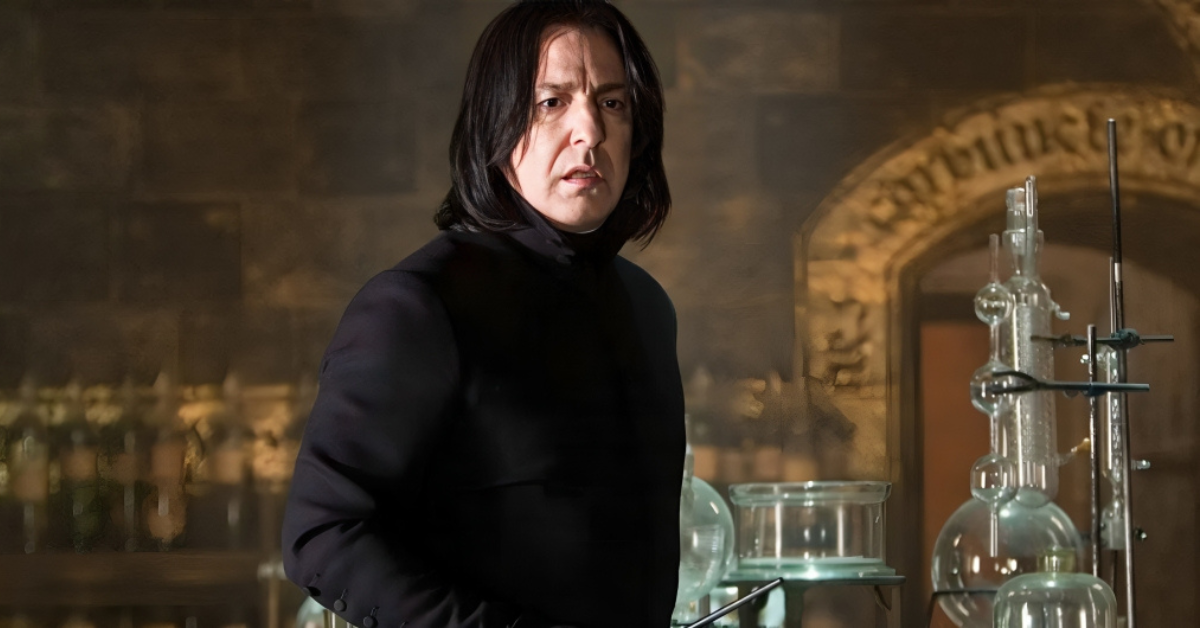
Hey everyone, Welcome to another installment of Harry Potter Theory. Today we’re going to discuss how Voldemort went about killing Severus Snape.
Snape’s death is a big topic in the Harry Potter story, and when he died it was a truly tragic moment in the series—unless of course you don’t like Snape.
Recommended for You:- The REAL Reason Dumbledore DENIED Snape the Defense Against the Dark Arts Job
- Why Didn’t Voldemort Attack the Longbottom Family?
- The Meaning Behind Prominent Deaths in Harry Potter
- The Hidden Truth About Blood Status in the Wizarding World
Snape’s Death
As you progress through the books and films, your perception of Snape is constantly challenged—is he good? Bad? What are his intentions? And in the end, it turned out that Snape was almost more devoted to the cause than anyone.
Snape later dies in the Deathly Hallows, after Voldemort comes to the conclusion that he will need to kill Snape in order to become the true owner of the Elder Wand.
However, we do also find out later that Snape died in vain, as he was never the true owner of the Elder Wand after all and was simply unnecessarily killed by Voldemort.
Voldemort’s Method
What was always interesting about Voldemort killing Snape was that he didn’t do it himself—he used Nagini.
So, we know that Snape ultimately dies at the hands—or mouth rather—of Nagini on Voldemort’s orders, but what I found unusual about Snape’s death was the very significant ABSENCE of Avada Kedavra, aka the killing curse.
- Voldemort is a massive proponent of the killing curse—he can’t get enough of it, and its very purpose is to kill—so why wouldn’t he use Avada Kedavra on Snape?
- Instead, he uses Nagini to finish Snape off.
The Encounter
From the books:
“Why doesn’t it work for me, Severus?” In the silence Harry imagined he could hear the snake hissing slightly, as it coiled and uncoiled—or was it Voldemort’s sibilant sigh lingering on the air.
“‘My—my lord?’ said Snape blankly. I do not understand. You—you have performed extraordinary magic with that wand? No, said Voldemort. I have performed my usual magic. I am extraordinary. But this wand?”
“No. It has not revealed the wonders it has promised. I feel no difference between this wand and the one I procured from Ollivander all those years ago. The Elder Wand cannot serve me properly, Severus, because I am not its true master.”
“The Elder Wand belongs to the wizard who killed its last owner. You killed Albus Dumbledore. While you live, Severus, the Elder Wand cannot truly be mine.”
“‘My lord,’ Snape protested, raising his wand.”
“‘It cannot be any other way,’ said Voldemort. ‘I must master the wand, Severus. Master the wand, and I master Potter at last.’”
And Voldemort swiped the air with the Elder Wand. It did nothing to Snape, who for a split second seemed to think he had been reprieved.
But then Voldemort’s intention became clear—the snake’s cage was rolling through the air, and before Snape could do anything more than yell, it had encased him, head and shoulders, and Voldemort spoke in Parseltongue.
“Kill.” There was a terrible scream, Harry saw Snape’s face losing the little color it had left. It whitened as his black eyes widened, as the snake’s fangs pierced his neck as he failed to push the enchanted cage off himself, as his knees gave way and he fell to the floor.
Voldemort’s Reasoning
This excerpt depicts Voldemort’s puzzlement with why his newly acquired Elder Wand feels no different than any other wand that he has possessed. Essentially, Voldemort believes that because Snape killed Dumbledore, the Elder Wand’s allegiance lies with Snape, and that because the Elder Wand didn’t show allegiance to him, it just felt like any other wand.
- Voldemort deduces that because Snape killed Dumbledore, the Elder Wand has allegiance to Snape, and that by killing Snape, its allegiance will switch over to him.
- Voldemort is hesitant, as he doesn’t want to risk his plan backfiring. He believed that the wand would not be capable of killing its true owner, so he uses another method—one that is convenient and effective—Nagini.
The Elder Wand is simply the most ruthless of wands, in that it will only take into consideration strength. One would expect a certain amount of loyalty from one’s wand, so even if you were disarmed while carrying it, even if you lost a fight while carrying it, it has developed an affinity with you that it won’t give up easily.
If, however, a wand is won—properly won—in an adult duel, then a wand may switch allegiance. However, the Elder Wand knows no loyalty except to strength. It’s completely unsentimental—it will only go where the power is, so if you win, then you’ve won the wand.
Possible Personal Reasons
Besides the principal reason for Voldemort using Nagini—need to kill Snape—I think there’s another MAJOR reason that Voldemort killed Snape the way that he did.
- He liked him: One other reason that Voldemort may not have used Avada Kedavra on Snape is that he didn’t really want to kill him—at least not personally—and there are a number of reasons for this.
- Snape showed what Voldemort understood to be wavering loyalty to Voldemort and the Death Eaters for many years. To Voldemort, Snape had been a loyal supporter since the early days of the Death Eaters and even appeared to remain secretly devoted after Voldemort’s initial downfall.
- Snape was a valuable spy: Voldemort recognized Snape’s value as a highly skilled and effective double agent within the Order of the Phoenix, and his ability to infiltrate Dumbledore’s inner circle and gather crucial information about the Order’s plans made him an invaluable asset to Voldemort’s powers.
- Snape happened to have a high level of expertise in a number of wizarding disciplines:
- Legilimency and Occlumency: He was exceptionally skilled in delving into people’s minds as well as protecting his own mind from others.
- Potions: Snape also had exceptional knowledge and skill in brewing difficult and obscure potions, which made him an asset to Voldemort’s plans and experiments.
- Appreciation for Snape’s traits: Voldemort held a deep appreciation for cunning and ambition, traits that Snape possessed in abundance. Snape’s intelligence, resourcefulness, and cunning nature aligned with Voldemort’s ideals and might have contributed to Voldemort’s personal liking of him.
The Killing Curse and Intent
Bearing all of this in mind, next I want to discuss the killing curse. To be able to cast the killing curse, or any of the unforgivable curses for that matter, you must really hate someone and truly MEAN for the spell to hurt them.
- I think that Voldemort may have just had a little bit too much respect for Snape to kill him. Sure, Voldemort was a sociopath, but I think that he really appreciated Snape in a weird sort of way.
- You can’t perform an unforgivable curse like Avada Kedavra without proper intent. This is explained in the following excerpt:
“Never used an unforgivable curse before, have you boy?” she yelled. She had abandoned her baby voice now. “You need to mean them Potter, you need to really want to cause pain, to enjoy it. Righteous anger won’t hurt me for long. I’ll show you how it’s done, shall I? I’ll give you a lesson.” Those were of course the words of Bellatrix to Harry.
Conclusion
And those are the main reasons that I think that Voldemort never used Avada Kedavra on Snape. What is also worth mentioning is that Snape’s death in the books and films was quite different, and I’ve actually got a theory that builds on these differences.
If you want a blog on this, let me know down in the comment section below.



